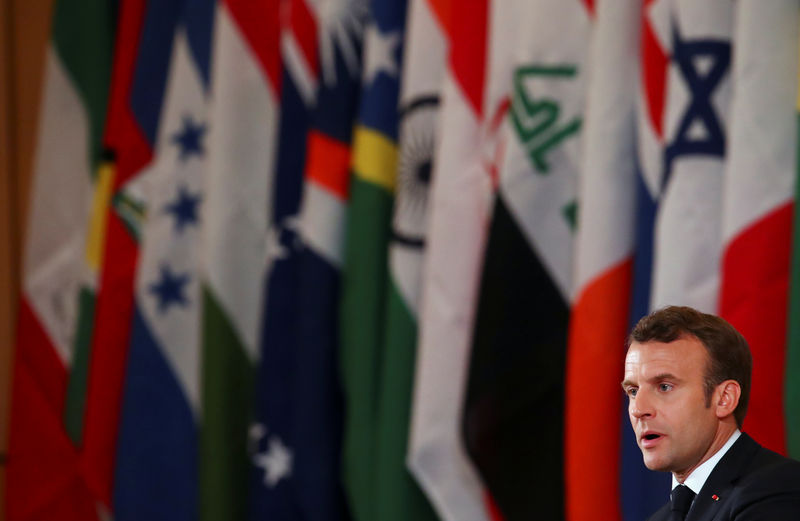By Michel Rose and Richard Lough
PARIS (Reuters) - France will reduce unemployment benefits for high earners and offer incentives to those who work beyond normal retirement age, two major planks of a renewed reform drive by President Emmanuel Macron after months of "yellow vest" protests.
Prime Minister Edouard Philippe unveiled the measures in an address to lawmakers that included commitments to put the environment and social justice at the heart of policymaking between now and the end of Macron's mandate in 2022.
Macron, 41, swept to power two years ago on a centrist platform, shattering the traditional mainstream parties on the right and left with a promise to create jobs and clean up politics.
While his early reforms to liberalize the regulation-choked economy drew protests by unions, with the past six months seeing weekly "yellow vest" protests, unemployment is now at a 10-year low, investment at a 12-year high and purchasing power is rising, Philippe said to cheers from ruling party lawmakers.
The economic data may be pointing in Macron's favor, but a combination of tax cuts for big business and the wealthy, reforms to loosen labor laws and the perception that he is arrogant have made the former investment banker unpopular among blue-collar workers and others struggling to make a living.
Philippe acknowledged that errors had been made. But he said it was time to relaunch Macron's reform agenda with what he called an "Act II".
Philippe said his government would create incentives for the French to stay in work longer and reiterated his intention to simplify France's unwieldy pensions system to make it fairer.
"As the president said, we must work longer," Philippe said in a speech setting out the policy priorities. "We will maintain the possibility to retire at 62, but we will define a pivot age and incentives to work longer," he said.
On unemployment benefits, Philippe said allowances would be scaled back for high earners who lose their jobs, and that he would put an end to some former employees receiving monthly benefits that exceeded their monthly salary.
"Social justice means making sure it pays to work," he said.
RECYCLED PLASTIC, IVF FOR LESBIANS?
The pension and unemployment benefit systems are hot-button issues that may reignite popular anger, even if the "yellow vest" protests have all but fizzled out.
"The real risk is doing nothing simply because we had this 'yellow vest' crisis and we don't want to stir it up again," said independent lawmaker Matthieu Orphelin. "We must not make every decision in the context of a crisis we are not quite out of yet. If we do, policymaking will be paralyzed."
Macron's relaunch comes two weeks after his party finished second to the far right in European elections, but strong enough to be at the heart of a centrist alliance that looks set to be a kingmaker in the European parliament.
Europe's Greens will be a target for Macron and Philippe played heavily on the environment, though was light on detail: France was committed to reducing its reliance on nuclear power, would extend a subsidy to help households swap old dirty cars for cleaner models, and would target recycling of all plastic.
Philippe said he was confident of reaching consensus on allowing IVF for lesbian couples, choosing his words carefully on an issue that conservative voters who have ditched the center-right party for Macron may take issue with.
Political opponents from the hard-left France Insoumise (Unbowed?) party mocked the speech as a "tedious exercise of self-congratulation".
Macron said last week the "yellow vest" crisis had mushroomed just as he went through a "death valley" phase: when the first reforms had been unveiled but before they had a chance to yield results or show their benefit.

Since it began last November, initially in opposition to fuel-tax increases before morphing into a wider anti-Macron protest, the "yellow vest" movement has weakened markedly, plagued by infighting and misdirection. From more than 300,000 people in each of the first weeks, turnout is now barely 15,000.